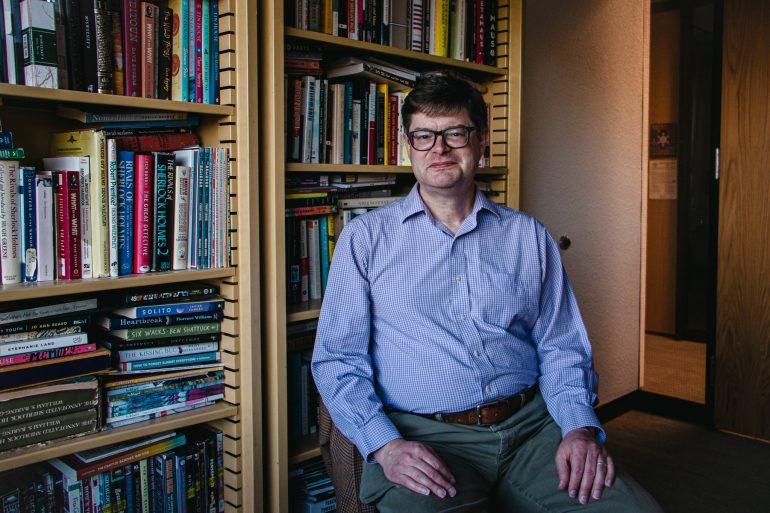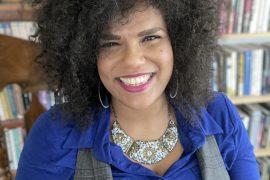Paul Collins’ literary life spans decades. It was ignited by two things: his (paradoxically) non-literary parents and his rural-valley isolation during his youth. Collins grew up in small-town Pennsylvania where he passed the time reading and walking in the woods. It seemed inevitable that he would begin writing, and he did. Fiction was his forte, though while waiting for a manuscript of short stories to be published, he was drawn to a new form. He decided to explore nearly-forgotten figures from history and write about them. Those stories turned into Banvard’s Folly, published in 2001. Since then, Collins has written ten books. He’s written extensively for magazines as well, those which include McSweeney’s, The Believer, The New Yorker, and Lapham’s. He became a Portland State faculty member in 2006 and has since taught courses on creative writing and memoir writing. I sat down with him recently to discuss his career, his style, and his life outside of academia.
Interviewer
You grew up in Pennsylvania, is that right? Not far from Philadelphia?
Collins
Yeah, It’s about 35 miles away from Philly.
Interviewer
Do you think the place in which you grew up shaped your interest in writing?
Collins
It very directly shaped it. Maybe in two ways. One is that I spent a lot of time reading. That might have been the case wherever I lived, but the fact was I lived in an area in which there, frankly, wasn’t much to do. I grew up in a place called – and this is a real name – Perkiomenville. There was basically nothing. I think there’s a gas station and a convenience store now, but not when I was growing up. Even my friends from school weren’t within walking distance. So I just spent a lot of time hiking around and reading.
The other thing is sort of the inadvertent influence of my parents. They weren’t big readers but they liked to collect antiques. They used to go to antique sales and buy these huge lots of stuff. My parents often only wanted one item from the lots, and there would always be books in the lots that they’d hand off to me. That meant that I’d get random piles of books every once in a while. In a way, it was actually ideal because I was just reading omnivorously.
Interviewer
Which books stand out in your memory?
Collins
A few come to mind. I don’t know if I understood them as being influential in any way. John McPhee’s Coming Into Country. It stood out to me in part because it wasn’t like anything I’d ever read. In fact, I just recently teached an excerpt from it. He had this long account of a random chef in Pennsylvania. I just hadn’t read anything like it, 80 pages hanging out with a chef in his kitchen. That’s not really something you read when you’re a kid. I probably would have chosen Star Trek novelizations. But I read anything.
A few more stand out. My brother gave me Franz Kafka’s Metamorphosis. I was really confused by it. That was when I was still in elementary school. What I knew about it was that someone turns into a cockroach, so I was expecting sci-fi. I was wondering when the alien that did this to him would show up, but it just ends. I was confused, but it gave me the first insight into the idea that plots don’t have to operate in a certain way.
Interviewer
Did you gravitate towards fiction or nonfiction in your youth?
Collins
Oh, fiction. Absolutely. And as a writer, I just assumed I was going to write fiction. The courses I took as an undergrad were in fiction. And through most of my twenties, I was writing fiction. Actually, what happened was, in my late twenties, I finished a short story collection and sent it to a bunch of publishers. One, a small independent publisher in San Francisco called Mercury House, was interested in publishing it. I wasn’t hearing from them and I continued to wait, so much so that it took away from my other writing. So, almost just to pass the time, I decided I was going to write a nonfiction essay. That turned out to be my first piece for McSweeney’s. Eventually it turned into my first book, Banvard’s Folly.
Interviewer
Did that collection of stories ever get published?
Collins
No. I haven’t even looked at the manuscript since then. I’m sure I’d be horrified.
Interviewer
In what ways have you become a better writer since then?
Collins
I’ve become a better researcher. The tools are better too. I also have a better sense of deliberateness and craft, in terms of thinking about structure for example. Some of that just came from experience, in doing lots of books. Some of it’s come from teaching. When I started writing, a lot of it was just instinctive – I knew what a good story was and what wasn’t. Or a good paragraph. Or what sequence to put things in. But if you would’ve asked me, “why?” I’d say, “I don’t know. It just works better that way.”
Once I started teaching, I had to do better than that. I had to be able to go over a piece with a student and say not just, you should consider doing X, Y, and Z, but also explaining why. That allows a writer to be more in control of their abilities.
A good example of that is my first piece for McSweeney’s. It was about the Great Moon Hoax which happened in the 1830s in New York. This newspaper published a story about how astronomers with powerful new telescopes had discovered living beings on the moon. It made a big splash at the time, but eventually people started realizing that it was a hoax. So I wrote a story about it and when I sent it to McSweeney’s, Dave Eggers said it was great, that there really wasn’t much of anything that he wanted to change except one thing – the final paragraph. In it, I tried to reach for a big philosophical, overarching point to it all. He said, “I don’t know if you need a big finish here. Just end it one paragraph earlier.” So I just chopped the paragraph off, and it worked better.
Interviewer
It was too clean?
Collins
That kind of explains it. One thing I’ve come to learn over time is that you have to let the reader own the meaning of the story. You have to turn it over to them and let them draw their own conclusion, let them figure it out. Otherwise, it’s just not going to move them. If the author is doing all the thinking for the reader, there’s no interpretive space, no space for the reader to take ownership. Sometimes a moral-of-the-story can be detrimental to the piece.
Interviewer
How do you approach editing?
Collins
In a few ways. Reading a piece twice, for one. The first time you’re reading something, you’re almost like a passenger in a vehicle. You don’t really know where it’s going. You’re not in charge. When you read a piece a second time, though, you already know where it’s going so you can see things being laid out by the writer.
Secondly, I edit with the understanding that what’s in a piece and how it’s sequenced isn’t necessarily the way it’ll look in its final form. It’s sort of a running joke among my students. I often draw a rectangle around paragraphs and put arrows saying, “move this here,” “try moving this down there,” “cut this,” “move that.” And I don’t do this because the student’s piece is a train wreck. It’s because I want my students to have a sense of fluidity in their work. I want them to know that they can actually rearrange the structure in a number of ways. And depending on the student’s intention, those structures may actually work better.
Interviewer
What makes a good writer?
Collins
Curiosity. Very specific kinds of curiosity. It’s a readiness to note details that stand out. Even if they don’t know why those details stand out to them. It could be a particular person or a particular event or an object even. It resonates for some reason. It’s pursuing that, asking questions about it.
Interviewer
Do you think curiosity plays into a writer’s voice?
Collins
I think so. John McPhee is a good example of this. He can write about almost any subject in a way that will carry the reader along. He has this thing about geology. He constantly wants to write about geology. He did a really long piece for the New Yorker about 20 years ago about gravel. As soon as I saw it I thought, really? Am I really going to read this many pages on gravel? But I did, and it was actually quite good. Not because I had any particular interest in gravel, but because he did. And he really ran with it.
Watching someone else get really fascinated by a subject, that’s really reflected in their voice. And the reverse is true, too. If someone is writing a paper about a subject which they don’t care about, it’ll be reflected in their voice.
Interviewer
Your book Not Even Wrong, which recounts your son’s autism diagnosis, stands out as quite unique among the list of your many published works. Yet you seem to have approached it using a similar framework as in your other books, one of a historical investigation. Would you say that’s accurate?
Collins
Yeah. And that came about partly because that’s the kind of thing I’m interested in. But, also, there was a practical element to it. At the time, my second book had just been published and I was starting to kick around. I was thinking about writing another book about Peter the Wild Boy which interested me, though I wasn’t sure why. Then Morgan got his diagnosis, and at some point it just dawned on me. It felt like they were, in some way, parallel tracks. I wanted an almost braided structure to the book where I went back and forth between the family story and the history of autism.
Interviewer
What were you thinking after he got his diagnosis? Did you know right away that you wanted to write a book about it?
Collins
I spent a couple weeks just in shock. As we pulled ourselves together, we said, “okay, now what do we do?” I realized that this was a big deal. I didn’t know If I was going to write about it, but I figured I should probably take notes. At some point I started to think that it would actually make a lot of sense to write about it.
One thing that stood out was that, in those first couple of weeks of really not knowing what to do and not fully understanding what autism was, I was wondering what people even do after a diagnosis. I remember thinking, what would have been a good book that someone could have handed me in that initial period? Not necessarily a guide, but a literary work about autism. So that’s what guided my writing it.
Interviewer
Do you think that process informed the way you parent?
Collins
I don’t know if it informed how I parent. But, it’s funny, it probably did inform how I approach memoir, in writing about it and also how I teach it. I really had to think about, what does it mean to write about a kid? What does it mean in terms of privacy or how it affects them? In his case, I have to admit that it wasn’t that difficult of a question. His condition is so apparent when you meet him. He may have a vague sense that I write things, but I don’t think he’s aware that I’m an author or that I’ve written books or anything like that. He doesn’t really have a concept of how other people see him necessarily. His disability is pretty severe. He’s only just barely verbal. So I thought, there is a real purpose or service to writing about this, about him. And I don’t think it was intrusive on his sense of privacy. But writing about him did make me think, what if I were writing about another family member?
Interviewer
Do you think being a parent has changed you as a writer?
Collins
Yeah, in a couple of ways. For one, it forced me to become a lot more efficient. I used to get up really early, knowing that no one would be up at 5a.m.. That’s when I would do a lot of my writing. I wrote as quickly as I could for about an hour and a half. I’ve also become much more focused.
Interviewer
Do you see any major shifts in writing that have happened over the last decade?
Collins
Structurally, it’s gotten a bit more diverse. I think part of that probably has to do with the influence, not just of literary quarterlies, but also being able to write online where length restrictions are not as much of an issue. Also, so much has become digitized. When writing about history, you often really depended on cataloging. That relied on someone having thought a particular thing was important enough to note in an index. But when something is digitized, it treats all text equally. Suddenly there is a depth of detail. It can be a bit overwhelming. But it also has an equalizing effect.
Afterword
My conversation with Paul lasted just over an hour. Outside were chants of a pro-Palestinian rally that roused our attention. Though fascinated by his life and holding still more questions for him, I promised not to take anymore of his time. He shooed off my concern with a smile and his insistence that he’d been happy to sit down for a chat, holding to an ever-present bonhomie.





